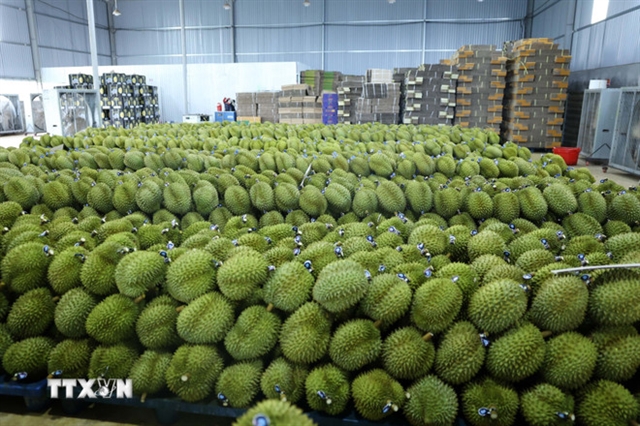 Society
Society


|
| Durians stacked up at a business in Đắk Lắk Province have traceability for export. VNA/VNS Photo |
HÀ NỘI – The Ministry of Agriculture and Environment has issued a decision on the food safety monitoring process for the export of fresh durian.
This is the first time Việt Nam has a unified, mandatory process for the entire chain, including production, harvesting, transportation, preservation and packaging.
This comes as export output demands rise with expanding market share, such as China, South Korea, Japan and Europe, requiring higher standards.
According to the Ministry of Agriculture and Environment, the process not only focuses on tightly monitoring food safety and hygiene but also gradually sets up a monitoring system throughout from planting areas to packaging and export units.
Organisations and individuals who take part in the durian exporting chain, including businesses that are not directly engaged in the processing stage but act as exporters, are subject to this decision.
The ministry requested that all durian growing areas and packing facilities be inspected, supervised, assigned codes and included in a list recognised by the importing country (if any). Even if they already possess international certifications such as VietGAP, GlobalGAP, HACCP or ISO 22000, these facilities must still undergo periodic evaluation or sign commitments and be subject to inspection for compliance with those commitments.
For the first time, storage and transportation of durian have also been assigned specific responsibilities, in which the packing facility is primarily responsible for checking the safety conditions of the entire input supply chain.
For export shipments, if the importing country requires an official food safety certificate issued by a Vietnamese authority, exporters must register for inspection and obtain confirmation of compliance before exporting.
Local authorities are also required to report monthly on newly certified growing areas and packing facilities so that the list recognised by the importing countries can be promptly updated.
The ministry said that this regulation marks a decisive shift towards greater transparency and quality elevation of Vietnamese durian, aiming to eliminate the issue of “borrowing planting area codes” and prevent the risk of being banned from key markets. VNS




